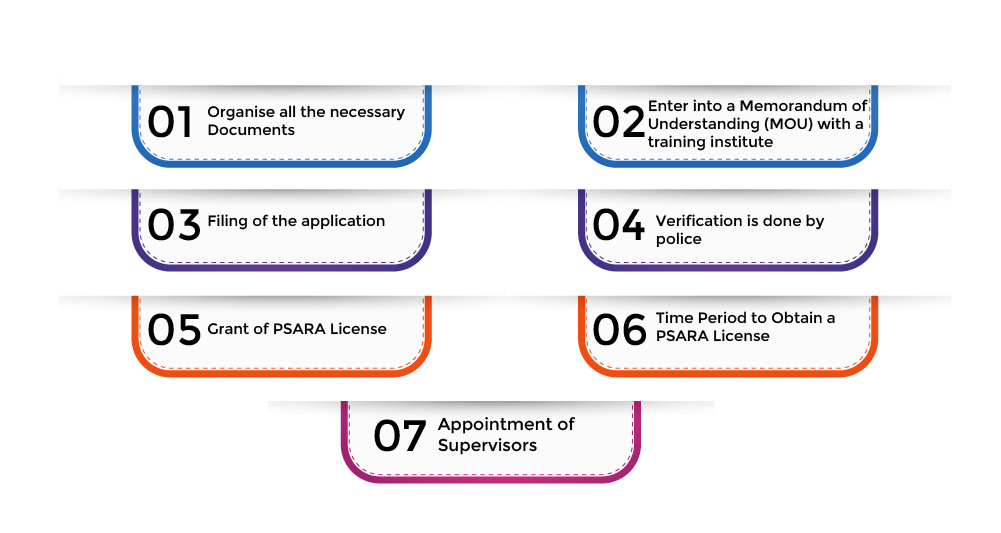What is Pasara License
In today’s fast-paced world, more individuals are aspiring to establish their own businesses or ventures. This surge in small enterprises within the commercial landscape has amplified the demand for safety and security measures.
Businesses specializing in training and providing security services are known as security agencies. Today, numerous private security agencies have been established to address the security needs of individuals and businesses alike. In India, the operations and activities of these private security agencies are governed under the Private Security Agencies Regulation Act, 2005 (PSARA), ensuring compliance and oversight.
Private Security Agency
The Private Security Agencies Regulation Act (PSARA) is a legislative act enacted by the Government of India to regulate the operations of private security agencies. PSARA oversees the registration process and ensures that these agencies comply with established guidelines.
The demand for private security services has significantly increased due to the rise in business establishments in recent years. Many private entities, firms, individuals, and properties are increasingly hiring security personnel from private sources, leading to the establishment of numerous private security agencies nationwide. While these agencies address the growing need for security in the private sector, concerns have also arisen regarding their operations and compliance. To address this, the PSARA Act introduced a comprehensive set of rules to regulate the functioning and registration of private security agencies.
A PSARA License is a mandatory requirement for anyone wishing to start a private security business in India. A private security agency refers to an entity providing private security guards and related services as an alternative to law enforcement. These agencies operate under the regulatory framework established by the Private Security Agencies Regulation Act, 2005, which is enforced by the Department of Internal Security, Ministry of Home Affairs, Government of India.
As per the PSARA Act, obtaining a license from the designated State Controlling Authority is a prerequisite for operating a private security agency. Non-compliance with this requirement can lead to severe penalties. The application for a PSARA License must be submitted to the competent authority of the respective state. The license can authorize operations in one or more districts or even across the entire state, depending on the scope of approval.
Who Should Apply for PSARA License?
The PSARA, or Private Security Agencies Regulation Act, is legislation enacted by the Government of India to regulate private security agencies. The PSARA ensures that private security agencies are registered and operate in compliance with the law. With the rapid growth of business establishments in recent years, there has been an increased demand for security services. Many private establishments, firms, and individuals have turned to private security guards, leading to the rise of numerous private security agencies across India. While these agencies help meet security needs, there are concerns regarding their operations, prompting the creation of the PSARA to ensure proper functioning and regulation.
A PSARA license is required before starting a private security business in India. A private security agency is defined as an entity providing private security guards and related services as an alternative to the police. The operations of these agencies are governed by the Private Security Agencies Regulation Act, 2005, which is enforced by the Department of Internal Security under the Ministry of Home Affairs, Government of India.
Under the PSARA Act, security agencies must obtain a license from the relevant State Controlling Authority before starting operations. Non-compliance with this requirement can result in strict legal consequences. To apply for a PSARA license, an agency must submit an application to the competent state authority. The license allows the agency to operate in one or more districts within a state or across the entire state.
What Is the Legal Provision for Psara License?
Law: The Private Security Agencies (Regulation) Act, 2005
Rules: Private Security Agencies Central Model Rules, 2006
Enforcement Date: 14th March 2006
State Government Role:
Although PSARA is a central law, Section 3 of the Act mandates each state to designate an officer, not below the rank of Joint Secretary, as the controlling authority. This designation must be made through a formal notification.
Validity of License:
The PSARA License is valid for a period of five years from the date of issuance. To ensure continuity, the application for license renewal must be submitted at least 45 days before the license’s expiration. If the license expires, the applicant will need to file a fresh application to obtain a new license.
What Are the Eligibility Criteria Under Psara?
Eligibility for PSARA Registration Based on Business Organization Type
The following types of business entities are eligible to register under the Private Security Agencies Regulation Act (PSARA), 2005, and obtain a PSARA license:
- Sole Proprietorship
- One Person Company (OPC)
- Limited Liability Partnership (LLP)
- Association of Persons
- Private Limited CompanyEligibility Criteria for Directors/Principal OfficersThe position of Director or Principal Officer is subject to specific eligibility criteria as follows:
- Must be an Indian citizen.
- Must be at least 18 years of age.
- Must have sufficient financial resources to cover business expenses.
- Must not have any criminal convictions.Eligibility Criteria for Security GuardsTo qualify as a security guard, an individual must meet the following requirements:
- Must be an Indian citizen.
- Must be between the ages of 18 and 65.
- Must have received prior training.
- Must not have been terminated from any government service for any reason.
- Must meet the desired physical attributes.
- A verified assurance of good character is mandatory.
Documents Necessary for Obtaining a Psara License
The following registration certificates:

Mandatory Documents for PSARA License Application
To apply for a PSARA license, the following documents are required:
- Business and Tax Registrations
- PAN (Permanent Account Number)
- GSTIN (Goods and Services Tax Identification Number)
- Provident Fund Registration
- ESIC (Employee State Insurance Corporation) Registration
- Registration under the Shops and Commercial Establishments Act
- Registration under the Labour Act
- Identity and Address Proof
- Proof of identity for the directors and employees
- Proof of address for the agency office
- Affidavits and Declarations
- Affidavit as per Section 7(2) of PSARA, 2005
- Security Training Affidavit
- Directors’ Credentials
- Copies of the Income Tax Returns of the directors
- Two passport-sized photographs of the promoters with their PAN
- Agency Establishment Documents
- Certificate of incorporation
- Memorandum of Understanding (MOU) with a recognized training institute
These documents are essential to comply with the guidelines established under the PSARA, 2005.
What Are the Eligibility for the Directors/owner
Eligibility Criteria for PSARA License
To ensure compliance with the Private Security Agencies Regulation Act (PSARA), 2005, the following criteria must be met by the directors, partners, owners, or key personnel applying for the license:
1.Eduction
- The applicant must have completed at least the 8th standard or a higher level of education
2Nationality & Age
- Must be an Indian citizen.
- Must be above 18 years of age.
3.Special Qualification
- Completion of specialized training conducted by a recognized training institute is mandatory for the owners, directors, or the applicant’s principal officer.
- This training is designed to equip them with the necessary knowledge and skills to effectively manage a security agency.
- Special qualification training is also required for applicants with an army background.
4 Clean Antecedents
- Verification by Authorities: The antecedents of key persons, such as directors or principal officers, are verified by the police department or the Controlling Authority.
- Details Verified:
- Residential address as per the documents submitted.
- Any involvement in criminal activities in India.
- Additional Certification: The Controlling Authority may request a certificate from the Tehsildar to confirm clean antecedents.
- Clarification on Bind Over Cases:
- The term “Bind Over” refers to holding an individual for trial on bond (bail) or in custody pending the outcome of proceedings.
- It is crucial to confirm that no pending “Bind Over” cases exist against the applicant or their key personnel.
These requirements ensure that only eligible and qualified individuals are authorized to operate private security agencies under the PSARA, 2005.
Procedure to Obtain a Pasara License

Document Organization
Gather and arrange all necessary documents to ensure a seamless and expedited application process for obtaining the PSARA license. Documents related to registrations and details of promoters and directors must be clear, legible, and error-free to prevent delays. Once organized, the application can be submitted through the online portal. The e-signing feature further simplifies the process, allowing the entire application to be completed digitally.
Memorandum of Understanding(MOU)with Training Institute
Applicants must sign an MOU with an eligible training institute to provide the necessary training to their candidates. A list of approved training institutes is available on the official platform for easy access.
Application Submission
After completing the required preparations, the applicant must submit Form-I to the respective state authority along with the required documents. Form-II, for antecedent verification, and Form-III, as an affidavit, must also be included with the application.
Police Verification
Following the submission of Form-I, police verification is conducted. In cases where the agency is a partnership or a company, all directors must undergo police verification.
PSARA License Grant
If the police issue a No Objection Certificate (NOC) post-verification, the authority reviews the application. Depending on their findings, the authority either grants the PSARA License in Form-IV or rejects the application.
Timeline for PSARA License Approval
The time required for obtaining the PSARA license varies by state, as it depends on the efficiency of the respective state authority. On average, it takes approximately 60 days from the date of application submission to receive the license.
Appointment of Supervisors
To comply with PSARA, 2005, applicants must appoint supervisors to oversee and manage the agency’s operations and the activities of the security guards. These supervisors should have at least three years of work experience in the army, navy, or similar fields to qualify for the role.
Why to Choose Legaltax
Access to Experts
We connect you with verified and experienced legal professionals who work diligently on your documents until you are completely satisfied. You can easily monitor the progress of your application at all times through our user-friendly platform.
Exceptional Customer Feedback
Our clients consistently praise our services, highlighting our commitment to simplifying complex legal requirements and providing regular updates. Their positive reviews reflect our dedication to customer satisfaction.
Robust Team of Experts
With a strong team of over 300 seasoned business advisors, we are just a call away to address any queries or concerns. Our experts ensure that your experience with us remains smooth, seamless, and hassle-free.
In the majority of Indian states, the PSARA license is valid for a duration of five years. However, in states like Uttarakhand and Chhattisgarh, the license validity is limited to just one year.
No, under the PSARA Act, each Indian state has the autonomy to establish its own rules and regulations for granting the license.
- For one district in a state: ₹5,000
- For 2-5 districts in a state: ₹10,000
- For the entire state: ₹25,000
Obtaining a PSARA License often requires professional assistance, incurring service-related costs. Additionally, the process involves visits to government departments and police stations, leading to further expenses.
Apart from government fees and professional charges, private security agencies also incur training expenses. Investment in a training institute ensures high-quality training for officers, and an MoU is signed between the applicant and the training institute, involving associated costs.
The Private Security Agencies Regulation Act, 2005 serves as the governing legislation for private security agencies in India.
Yes, it is mandatory to renew the license upon its expiration.
No, it is not mandatory for applicants to be ex-servicemen or army personnel. Anyone meeting the eligibility criteria can apply for the license.
PSARA License is state-specific, meaning the agency must obtain a separate license for each state in which it operates.
Although the governing act was passed by the Indian Parliament, the rules and regulations are determined by the states. As a result, the procedure may vary from state to state.
Yes, it is allowed as per the rules of the PSARA Act, 2005. Foreign Direct Investment (FDI) can be made up to 49% in a company or business.





